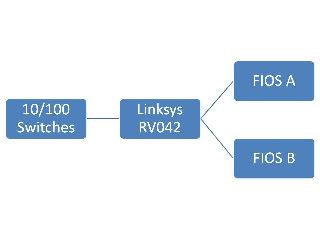I need a router that has gigabit LAN ports (number is not important) and two 10/100 WAN ports to load-balance two Internet connections. Other than that, it needs to be reliable and relatively quick, and not much else. Cost is a factor; there is no fixed budget, but cheaper means more likely to happen, if you know what I mean.
This will connect 20-30 workstations and 18 IP phones in two buildings, with two 20 Mbps down/5 Mbps up FIOS connections. Most users will be doing typical email/Web browsing, but a few (usually 1-3) will FTPing gigabytes at a time. It does NOT need to have a lot of WAN ports because we will be able to buy gigabit switches separately if needed, but more ports wouldn't hurt.
Any advice would be appreciated.

This will connect 20-30 workstations and 18 IP phones in two buildings, with two 20 Mbps down/5 Mbps up FIOS connections. Most users will be doing typical email/Web browsing, but a few (usually 1-3) will FTPing gigabytes at a time. It does NOT need to have a lot of WAN ports because we will be able to buy gigabit switches separately if needed, but more ports wouldn't hurt.
Any advice would be appreciated.


